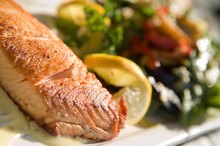Why Do High Protein Diets Make One Urinate More?
A high-protein diet is a diet in which 20 percent or more of your calories each day come from protein 1. It also emphasizes a restriction on carbohydrates, causing the body to burn stored body fat rather than glucose for energy. This process is called “ketosis,” which is possibly one reason why you may urinate more when you follow a protein diet 1. A more likely reason is the fact that a protein diets generally includes increased water consumption 1.
Protein Diet History
High protein diets became mainstream in the 1990s with the advent of the Atkins Diet 1. The Atkins Diet was the brainchild of Dr. Robert Atkins, a cardiologist who started the plan in an effort to lose weight himself. Atkins claimed that a diet consisting primarily of proteins derived from poultry, beef, eggs and fish assisted weight loss and fought off disease and improved energy levels. Since then, many similar plans have followed suit.
- High protein diets became mainstream in the 1990s with the advent of the Atkins Diet 1.
- The Atkins Diet was the brainchild of Dr. Robert Atkins, a cardiologist who started the plan in an effort to lose weight himself.
Protein Diet Plan
Meat & Egg Diet Plan
Learn More
Protein diets feature foods from the poultry, beef, eggs and fish categories, and severely limits carbohydrate rich options such as:
- breads
- pasta
- fruit
- starchy vegetables 1
For instance, dieters on a protein plan might have a bacon cheeseburger with mayonnaise and mustard for lunch, but not eat the bun 1. Steak and bacon would be fine for dinner, as long as the meal is not complemented with a potato. Sugars and caffeine are almost entirely forbidden as well.
- Protein diets feature foods from the poultry, beef, eggs and fish categories, and severely limits carbohydrate rich options such as: * breads
* pasta
* fruit
* starchy vegetables 1 For instance, dieters on a protein plan might have a bacon cheeseburger with mayonnaise and mustard for lunch, but not eat the bun 1. - Steak and bacon would be fine for dinner, as long as the meal is not complemented with a potato.
Protein Diets and Water
Since protein diets are low in fiber and high in sodium, most recommend drinking anywhere from seven to 10 glasses of water per day. Water helps the digestive system, increases metabolism and rids the body of toxins. It also assists the functions of key organs such as the kidneys and liver. Needless to say, anyone who increases their water intake is likely to urinate more as they flush the body.
- Since protein diets are low in fiber and high in sodium, most recommend drinking anywhere from seven to 10 glasses of water per day.
- Water helps the digestive system, increases metabolism and rids the body of toxins.
Protein Diets and Ketosis
Side Effects of the Lemonade Diet
Learn More
Ketosis occurs when the body takes in less than 100g of carbohydrates per day. Protein diets typically limit carb intake to less than 50g per day--and many keep it at less than 20g per day during the first two weeks (also known as the “induction” phase) 1. This causes the body to form ketones, or molecules that form during the breakdown of fat. Most ketones are harmless and are even beneficial when used for energy. However, acetone is a ketone that is not used for energy, and is simply emitted from the body as waste. This is possibly one reason why someone following a protein diet may tend to urinate frequently 1.
Summary
Medical experts have expressed concern about the long-term effects of high protein diets on the kidneys, liver and heart 1. However, such plans have proven to assist with weight loss, and there is no evidence that protein diets will have a negative impact on overall health 2. Either way, chances are that anyone who urinates frequently while following a protein plan is doing things right--as it likely means the increased water intake and ketosis are simply at work 1.
Related Articles
References
- Health Goods
- Josse AR, Atkinson SA, Tarnopolsky MA, Phillips SM. Increased consumption of dairy foods and protein during diet- and exercise-induced weight loss promotes fat mass loss and lean mass gain in overweight and obese premenopausal women. J Nutr. 2011;141(9):1626-34. doi:10.3945/jn.111.141028
- Carreiro AL, Dhillon J, Gordon S, et al. The macronutrients, appetite, and energy intake. Annu Rev Nutr. 2016;36:73–103. doi:10.1146/annurev-nutr-121415-112624
- Ganesan K, Habboush Y, Sultan S. Intermittent fasting: The choice for a healthier lifestyle. Cureus. 2018;10(7):e2947. doi:10.7759/cureus.2947
- Pasiakos SM. Metabolic advantages of higher protein diets and benefits of dairy foods on weight management, glycemic regulation, and bone. J Food Sci. 2015;80 Suppl 1:A2-7. doi: 10.1111/1750-3841.12804
- Delimaris I. Adverse effects associated with protein intake above the recommended dietary allowance for adults. ISRN Nutr. 2013;2013:126929. doi:10.5402/2013/126929
- Bouvard V, Loomis D, Guyton KZ, et al. Carcinogenicity of consumption of red and processed meat. Lancet Oncol. 2015;16(16):1599-1600. doi:10.1016/S1470-2045(15)00444-1
- U.S. Department of Health, U.S. Department of Agriculture. Appendix 7. Nutritional Goals for Age-Sex Groups Based on Dietary Reference Intakes and Dietary Guidelines Recommendations - 2015-2020 Dietary Guidelines.
- Rodriguez NR, Dimarco NM, Langley S. Position of the American Dietetic Association, Dietitians of Canada, and the American College of Sports Medicine: Nutrition and athletic performance. J Am Diet Assoc. 2009;109(3):509-27. doi:10.1016/j.jada.2009.01.005
- Bray GA, Smith SR, de Jonge L, et al. Effect of dietary protein content on weight gain, energy expenditure, and body composition during overeating: a randomized controlled trial. JAMA. 2012;307(1):47-55. doi: 10.1001/jama.2011.1918. Erratum in: JAMA. 2012;307(10):1028.
- Centers for Disease Control and Prevention. Nutrition for Everyone: Protein.
- de Souza RJ, Bray GA, Carey VJ, et al. Effects of 4 weight-loss diets differing in fat, protein, and carbohydrate on fat mass, lean mass, visceral adipose tissue, and hepatic fat: results from the POUNDS LOST trial. Am J Clin Nutr. 2012;95(3):614-25. doi: 10.3945/ajcn.111.026328.
- Fox EA, McDaniel JL, Breitbach AP, Weiss EP. Perceived protein needs and measured protein intake in collegiate male athletes: an observational study. J Int Soc Sports Nutr. 2011;8:9. doi: 10.1186/1550-2783-8-9.
- Phillips SM, Zemel MB. Effect of protein, dairy components and energy balance in optimizing body composition. Nestle Nutr Inst Workshop Ser. 2011;69:97-108; discussion 108-13. doi: 10.1159/000329288.
- Te Morenga LA, Levers MT, Williams SM, et al. Comparison of high protein and high fiber weight-loss diets in women with risk factors for the metabolic syndrome: a randomized trial. Nutr J. 2011;10:40. doi: 10.1186/1475-2891-10-40.
Writer Bio
Sam Amico is a reporter for NBA.com and worked as a writer and editor at daily newspapers for more than a decade, covering everything from rock concerts to college football to courts and crime. He attended Kent State University and is the author of the book, "A Basketball Summer." He also is the co-host of a nationally-syndicated television show, "The Wine & Gold Zone."









